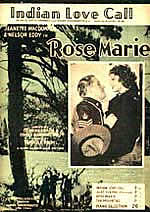 Rose Marie
Rose Marie
Book and Lyrics by Otto Harbach and Oscar Hammerstein
Music by Rudolf Friml and Herbert Stothart
Imperial Theatre, New York 2 September, 1924 (557 perfs)
Produced at the Theatre Royal, Drury Lane, 1925 (581 perfs)
Summary
When Black Eagle, a villainous half-breed, is knifed to death in his lonely cabin in the Canadian Rockies, "Wild Jim" Kenyon is the obvious suspect. The two men had a long-standing quarrel over a mining claim, and Jim is known to have visited the cabin on the fatal night. The Mounties, headed by Sergeant Malone, are soon on the trail. The situation shocks Jim's friends, for since he fell in love with little Rose Marie, they had found "Wild Jim" a reformed character. Perhaps the suave Hawley, at one time attracted to Black Eagle's sensuous wife, Wanda, but now hoping to marry Rose Marie, has knowledge which he is anxious to keep from the Mounties? Jim's faithful if ineffectual sidekick, "Hard-boiled Herman", and his girl friend "Lady Jane" are less help to their hero than they intend.
The Story:
Lady Jane owns a hotel in Saskatchewan, Canada. To the hotel comes Jim Kenyon, a hard-drinking, hard-living man whose wild ways have been tamed somewhat by the influence of Rose Marie, a young French Canadian. She is at the hotel also. Her brother, Emile, wishes to remove her from what he sees as Jim's unwelcome influence. Jim, meanwhile, is trying to settle a land claim with Black Eagle but when Black Eagle is found knifed to death in his lonely cabin, Jim becomes the prime suspect.
Jim, and his friend Herman, go to their mountain lodge where he can keep in touch with his sweetheart by using the Indian love call. Emile, however, tries to use blackmail to get his sister to marry a rich man - the price, keeping Jim's escape route secret. Gradually Rose Marie tells Emile she is beginning to believe that Jim did indeed commit murder. She tells her brother she will go to Quebec to marry a rich suitor but secretly she plans to follow Jim, wherever he goes.
When Sergeant Malone arrives with a warrant for Jim's arrest for murder, Rose Marie uses the Indian love call to warn Jim that he should escape alone.
Lady Jane moves to Quebec where she opens a fancy-goods shop and marries Herman. Jim turns up just before Rose Marie is about to marry Hawley, her rich suitor. He is accompanied by Wanda, the real murderer. Wanda threatens Hawley, who had witnessed the actual killing. Sergeant Malone is also nearby ready to arrest Jim. As Rose Marie moves down the aisle to the altar, Wanda confesses everything, including her love for Hawley. Herman, Malone and Lady Jane rush to Jim's lodgings and Rose Marie and Jim are united through the Indian love call
For the Chorus
A musical on the scale expected at Drury Lane in the years between the wars with girls' chorus particularly well catered for. The original West End production had a chorus of eighty, with three times as many women as men. Chorus singing is fully harmonised, and there are well-varied and spectacular numbers for dancers. Chorus appear as visitors to "Lady Jane's" saloon, Mounties, guests at Totem Pole Lodge, Totem Pole dancers and singers, mannequins, sales staff and customers of a fashion shop in Quebec, wedding guests and entertainers.
Characters
- Rose Marie.
- "Lady Jane".
- Wanda,
- Ethel Brander, a friend of Hawley.
- Jim. Herman.
- Malone.
- Hawley.
- Emile, Rose Marie's brother
Straight Role
Black Eagle.
Smaller Role
A caretaker.
Musical Numbers
- Bridal Finale (Bridal Procession)
- Door Of Her Dreams
- Hard Boiled Herman
- I Love Him
- Indian Love Call
- Lak Jeem
- The Minuet Of the Minute
- The Mounties
- One Man Woman
- Only A Kiss
- Rose Marie
- Totem Tom-Tom
- Vive la Canadienne
- Waltz Song
- Whenever Night Falls
- Why Shouldn't We?
The Scenes
Act I
"Lady Jane's" saloon.
Beside a campfire (front drop).
Black Eagle's cabin (inset).
Outside Totem Pole Lodge
Act II
A fashion shop in Quebec.
A ballroom.
An hotel cellar (front drop).
Kootenay Pass (inset)
Orchestration
1st and 2nd Violins, Viola, Cello, Double Bass, Flute, Oboe, 2 Clarinets, Bassoon, 2 Horns, 2 Trumpets, Trombone, Drums, Harp. An additional number sung by "Lady Jane" and male chorus appears in the script but not in the score.